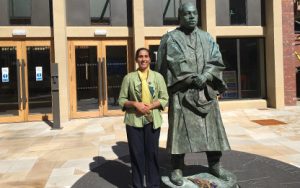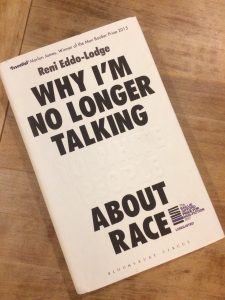October is Black History Month in the UK, and like many other institutions, the University is hosting a number of events to recognise the history, experiences and accomplishments of people from black and minority ethnic backgrounds, and to promote race equality more broadly. In this post, we talk to Vijaya Kotur, our University Race Equality Advisor, about her work and what staff and students can get involved with this month.
 Can you tell us a little bit about your role?
Can you tell us a little bit about your role?
My key responsibility is to work with everyone from across the University to support the organisation’s commitment to race equality. That means that I work with Professional Services and Academic staff, as well as undergraduate and postgraduate students. Based on the data and evidence available I’ll be ensuring that race equality is implemented in the University’s culture, policies and operations by measuring equality impact of race alongside other protected characteristics.
Our University has reached a lot through promoting and achieving various Athena SWAN awards. However, there are still inequities in areas, where people from diverse backgrounds have not reached their full potential or benefited equitably from the opportunities our University provides. Hence, my role will involve working with you all to raise awareness, challenging relevant issues and promoting the need to move away from the deficit model of race equality that has been around for generations.
What might an average day look like for you?
Each day is different and that’s what makes my job so interesting. I have to read a lot to keep myself abreast of any relevant changes in legislation and whatever is new out there. As the only person in this role, I get to meet interesting people from all over the University. I enjoy meeting with students as their enthusiasm is contagious and gives me more inspiration to work on race and equality matters.
An average day is: having a few meetings; acting on actions from meetings attended; writing up certain process or guidance that needs to be addressed; and researching new ideas that can be used to raise awareness on race equality within our University. But on some days, I might be running around like a headless chicken whilst responding to the demands of my day-to-day responsibilities!
What events have been organised around the University for Black History Month, and is there one that you are particularly looking forward to?
‘Black History Month’ means different things to everyone and pride for this month is expressed in a variety of different ways. For many, ‘Black History Month’ is a way of reflecting on the diverse histories of those from African and Caribbean descent, taking note of the achievements and contributions to the social, political, economic and cultural development of the UK. There are many events planned in and around the University by and for both staff and students, including:
- Tuesday 9th Oct (5.30 – 6.45pm): ‘Dying to be free: African-American suffering and death during the American Civil War’ by Prof James Downs (Connecticut College), an Insights Public Lecture, Curtis Auditorium.
- Wednesday 10th Oct (1 – 4.30pm): BAME Network Launch Event in Business School Partners’ Room (8th Floor).
- Friday 12th Oct (2.45 pm): Chi Onwurah MP speaks in The Lounge.
- Monday 15th Oct (1-5pm): Afro-Caribbean Society Drop-in at The Venue.
- Tuesday 16th (5.30pm): Panel Discussion on the history of art and music relevant to the black community at World Headquarters, 10 Carliol Square.
- Thursday 18th (6.30-9.00pm): Stand Up to Racism Event in the Lindisfarne Room.
- Thursday 18th Oct (5:30-6:.45pm): ‘If I survive’ Frederick Douglass family’s ‘struggle for liberty’ by Prof Celeste-Marie Bernier (University of Edinburgh) Lecture, Curtis Auditorium.
- Friday 19th Oct (all day): All Staff and Students are invited to partake in ‘Wear something Red Day’ to make everyone aware of the ‘Show Racism the Red Card’ campaign.
I am looking forward to promoting ‘Show Racism the Red Card’ as it will mark a commitment from our University that we stand against Racism in all its forms, and that we respect, celebrate and cherish our diverse communities represented within our University.
You’re running some Race Equality Awareness Workshops this month and early next year, can you tell us more about those?
These workshops are designed to support staff to strengthen their understanding of race equality and highlight the skills required for effective culture change. It introduces participants to key concepts within the field of race equality with the aim of improving knowledge and understanding about race and racism within a safe and reflective space.
These sessions should make an individual aware of what contributes to racial inequalities, their own privileges and how to challenge certain behaviours like micro-aggression, which knowingly or unknowingly happen all the time around us at the workplace. I am hoping that the sessions will enable staff to begin engaging with conversations on race equality much more freely.
What do you see as some of the major challenges in the HE sector around race equality?
The biggest challenge I find is that people within the HE sector find it very uncomfortable to talk about race. Any change takes time. We need resources to implement race equality in such a diverse and complex institution. We also need to ensure that the work life experiences of all staff are fulfilling, and students’ experiences at University will be measured by their attainment level by ethnicity.
Diversifying the curriculum will also be a major part of promoting race equality within HE, and that will be quite challenging. However, there are some fantastic people within our University who are committed, and with their backing I am positive that these challenges will become a bit easier.
Some universities holds Race Equality Charter awards for their work towards race equality, is Newcastle University aiming for this type of award?
Newcastle University is also working towards applying to be a member of Advance HE’s Race Equality Charter. Once we become a member, we are committed to applying to get a Bronze Award within three years. So we all need to start cracking on our work on Race Equality!

If our staff and students wanted to learn more about black history or race equality in the UK, is there anything that you would recommend they read?
One of the best books I would recommend for everyone to read is: ‘Why I’m no longer talking to white people about Race’ by Reni Eddo-Lodge. It’s an easy-read and relevant to the UK.
For any queries about the Race Equality Charter or the University’s work towards race equality, contact Vijaya.
